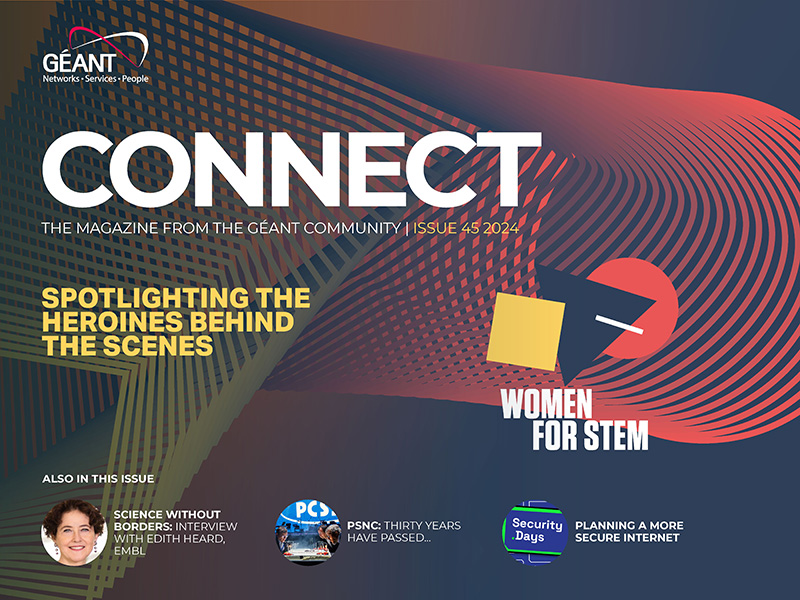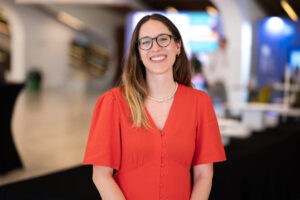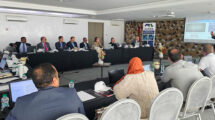
The Financial Times once called you “the epitome of a European scientist […] running a quintessential international research organisation”, and indeed EMBL has played an instrumental role in adapting existing data infrastructure to conduct genome analysis contributing to understanding and fighting the spread of the coronavirus infections. A true model of what can be achieved in very little time thanks to cross-country and cross-discipline science collaboration.
I am half British, half Greek, with British and French nationality. I was raised and educated in the UK. Then I moved to France for my post-doc and carried on my independent career there. And now I’ve moved to Germany to be in charge of EMBL, which has sites in five different countries but actually serve 29 – soon to be 30 – Member States across Europe as well as associates Member States, like Australia. So, yes, it is true that I feel that I have a very European perspective on life, not just on science, but the reason I took on the role is because, for me, EMBL represents a temple of molecular biology research and has a commitment to making science accessible to European scientists and globally, too.
I had only been at EMBL for one year when the pandemic hit us. There’s nothing like a crisis to really show you the value of people and organisations. In fact, it became immediately obvious how important EMBL was going to be for Europe in the context of the COVID-19 pandemic. We provide services and infrastructure, as well as training, and we perform fundamental research. Our site in Hinxton, UK, the EMBL-EBI, had developed data portals and these were used to collect the virus’ sequencing data, but also the data on the affected patients, and made it immediately accessible to facilitate tracking the spread of the virus. We also worked with the European Commission to use these portals as a basis to develop and deploy a pan-European COVID-19 research data platform.
Another type of infrastructure that we were able to deliver was at our site in Hamburg, where BioNTech were already testing mRNA delivery for vaccines, developed as a long-term collaboration, which contributed to the BioNTech/Pfizer vaccine.
Situations like the pandemic, when you already have tools and services that are up and running, show how infrastructures are so important as they are there to serve and deliver what’s needed at the most urgent times; to immediately rise up and to help not just Europe, but the world.
You said that you joined EMBL as Director General one year before the pandemic broke out. What can you tell us about leading a team through the pandemic in times when their research was most needed?
The pandemic was a very interesting yet challenging time. At EMBL we run everything – our research, our training, our services, our infrastructure, our technology development – from six institutes in Germany, UK, Spain, Italy, and France. When the coronavirus started to spread, each country that hosts us reacted differently and I had to make decisions about how to deal with the health and safety issues despite the urgency of our work. We did not shut down completely, but we did have to lockdown at all our sites to some extent, of course. For example, EMBL-EBI in the UK is one of our biggest institutes where it was critical that scientists and researchers continued to deliver both the research and services 24 hours a day, non-stop, because a lot of the bioinformatics tools that the research and science community were using to understand the spread of the virus were being developed there. Yet approximately 800 scientists had to work from home to deliver these databases and tools to the global community. We had to try to make sure people remained connected and motivated.
Science only works if you have the curiosity and inspiration to keep going. It is not a regular 9 to 5 job. Scientists put so much of their time and passion in their work that you have to keep that motivation and inspiration going.
I witnessed a similar situation at our lab in Heidelberg. Despite the limitations imposed by the pandemic, some of the most crucial research on the coronaviruses came out of our laboratories. We also had to deliver virtual international courses and conferences from there. And I already mentioned EMBL Hamburg where users such as BioNTech needed access to beamlines for vaccine development. We had to keep all these places running, we had to keep morale up, and be very aware of the health and safety issues.
But I think that every crisis has a silver lining. At EMBL, we are spread across many countries, so we had to start using video conference tools more broadly and connect virtually, but more frequently, and that changed our connectivity culture. It was almost a bonding exercise, and actually helped to bring all of our sites on to an equal footing. However, we are still seeing the impact as we are finally coming out of it. Those years of not being able to meet in person, brainstorm physically and of having to cancel events for almost two years – that really had an impact, but we can see the scientific community starting to revive now finally.
In the same interview with the Financial Times, you mentioned that Brexit and its downside on science funding has kept you preoccupied. You’ve worked to secured EMBL’s finances and formulated a new strategic plan for the years ahead. Now that the UK has finally rejoined Horizon Europe, what are your thoughts about the situation?
You cannot imagine how happy I was when the news was announced. A lot of people put a lot of effort into it, including the Nobel prize winner, Paul Nurse, who is a very firm advocate of European science. For him making sure that the British scientific landscape was not isolated but could still be connected to its continental European counterpart was crucial. For me, in charge of an organisation that has one of its sites in the UK, I could already start to see the impact of Brexit on British science. When collaborative EU projects were being set up, we knew that the scientists in the UK had so much to contribute, yet there were doubts about being able to include them because of Brexit and the uncertainty around it.
Now, we are back to business, and I hope that this will prove how strong the scientific community is. For me one of the most beautiful things about science is that it has no frontiers – we all talk the same language (figuratively!), we are all striving to discover the truth and if we don’t strive together it is usually much less impactful, so we have to be able to collaborate in the best and most efficient ways in order to make sure that the big and worthwhile investments that go into science – it is an expensive operation after all! – allow people to work together, to synergise. So, that was a really important historical moment for me. This also opens our eyes to where other fragmentation might be happening.
Science is about bringing people together with shared values and goals, and in these times of war, it is really important that scientists realise that we have to stick together because the science we do today brings the solutions of tomorrow. I hope the fact that the impact of Brexit on science could be reversed will help to serve as a lesson for the power of collaboration in the future.
And talking about the instability of the many geopolitical crises we are witnessing today, as well as the impact of climate change, what do you make of the future of European science?
EMBL was created after a crisis (WWII), when the need to strengthen European science was stronger than ever. EMBL was set up to provide a cutting-edge research environment for young scientists, with the opportunity to become independent very quickly without the ties of hierarchy that you could find in individual European countries. Another goal when EMBL was established was to provide access to infrastructures that are open to scientists across Europe and which allow science to be accelerated. That was really one of the strongest elements in setting up EMBL: to try and make sure that we provide some of these complex and expensive infrastructures that bring the scientific community together, because no small country could set up alone the equivalent of, for example, a synchrotron. The objective was to coalesce the force of European science that was already there and to make it both collaborative and cost effective.
In my opinion, once more the current geopolitical and planetary crises highlight the urgent need to bring people together in science. This makes it even more important that organisations like EMBL remain strong in order to serve science through research, infrastructures and training and to bring countries together. Since I arrived at EMBL, the number of Member States has increased from 26 to almost 30. We strive to enable scientists to work across borders, to join forces and collaborate.
The other crises that society faces are climate change and the impact that man has had on the planet. When I became Director General, we decided that EMBL should think about what we can do as scientists that would help rise up to such challenges. Although EMBL cannot provide the solutions to all our environmental problems, at least our scientists can consider how the science we are doing may be relevant to help tackle the biggest challenges.
For this reason, we launched a new programme, Molecules to Ecosystems. The idea behind it is that we should carry out basic research and provide technologies not just to help the human population but the planet as well. When we launched this programme almost two years ago, our Member States were very enthusiastic about it. We were awarded an increase in our budget, and we were able to launch our flagship project, which was TREC, Traversing European Coastlines, to sample 120 different sites; land and water interfaces affected the most by environmental pollution and climate change. With our mobile labs, which are currently part of TREC, we bring cutting edge technologies to local scientists rendering our science more accessible and allowing scientists to sample in situ and explore life in context.
As part of TREC, we also teamed up with the Tara Ocean Foundation to sample plankton ecosystems with the TARA schooner. We launched this project with the idea that, for us, this is not just about explaining the science behind a certain topic but also a way to engage with the public and politicians to show that science can happen in a very dynamic way in places where we know that crisis is hitting. More than ever before, research organisations like EMBL should be present and will be vital to rise up to these challenges, be they geopolitical or geophysical.
You’ve mentioned many times the importance of doing fundamental research and the value of infrastructure for the research and science community. Why are these two so precious?
These are two things that are key to EMBL, and I think we have to protect them.
There is increasing pressure for science (particularly biology) to move towards applications where there is funding, and away from what is termed “blue sky research”. This tendency is dangerous because strong fundamental research is essential for the applications of the future. EMBL is one of the few remaining bastions of fundamental science and curiosity and discovery-driven research. We are not asked to work on a particular topic, but we are given the freedom to explore with the best scientific minds in a very collaborative way, which is exciting. Thanks to this, our scientists come up with discoveries that provide the technologies that everyone is using today. An example is the technology that is the basis for cryo-electron microscopy (a revolutionary technique to visualise molecular structures in situ), which came about thanks to the explorations of the scientist Jacques Dubochet while he was at EMBL Heidelberg and that allowed him to discover the best way to cryo-preserve samples. This led him to the technology that got him the Nobel prize and he actually donated a copy of the medal to EMBL in gratitude for the support and freedom the organisation had given him! We should preserve and fund this kind of research and science.
Equally, allowing people to have access to top class infrastructures is crucial in order to nurture the science of the future. You need to invest in infrastructure so that they can evolve and bring people together. Not only it is cost-effective but collaboration is at the heart of success – getting people to talk to each other and do research with similar tools. One needs excellent, well-kept infrastructures for that.
As a woman scientific leader in STEM and EMBL’s first female Director General, what is the one piece of advice on making our work environments more inclusive that you would like to share with our readers?
For me, being a woman in a leadership position is important to the extent that it shows that it is obviously possible! Every life is unique of course, and my particular path was unique as well, but just showing that you can be a leader and a scientist at the same time is what my experience proves. You can care deeply about science and yet step into a leadership role where you will be faced with new challenges (including unexpected crises!).
As a woman in science, one can find challenges along one’s path, but one has to be willing to dare to take those steps and risks, without overcalculating these choices too much. I do think that there is a tendency now for people to try and be almost too careful about their career steps. I did not really calculate my trajectory too far in advance, but I did the things that mattered to me the most at the time I would make decisions. For example, changing from physics to biology when I was at university – that was a risk that I took as I had no background in biology at the time; or when I decided to do a PhD – that was also a choice that was not obvious at the time when most of my classmates were thinking of going into the private or financial sector. Also, in my later professional life, when I set up my lab I was not sure I wanted to be a group leader but I knew that what I was doing scientifically mattered to me so much that the only way to do it the way I thought it should be done was by running my own group. Similarly, when I took on the role at EMBL, I did it from a rather ideological perspective, because I care deeply about fundamental research and science, I care about Europe, and I care about making sure that scientists can work together. For me, EMBL represented all of that. Of course, I knew that taking the job would require me to step into a scene of senior leadership, but I accepted the role because I felt it was worth the effort, as long as I knew that I was doing it for the right reasons. This is the advice I would give – to really make sure that women dare to do what they want to do, for the right reasons!
I should also say that I feel quite strongly we should focus not just on women, but on full inclusiveness, to try and make sure that people from all backgrounds, ethnicities, and nationalities should have equal access to becoming scientists. Science is without frontiers – it is very important that we promote this concept, but I am still not convinced that we have found the right ways to do it. There is lots of work to be done.
Open science has a role here, too. It is one of the pillars of EMBL and a way to be inclusive. EMBL recently produced the AlphaFold Protein Structure Database in collaboration with DeepMind. AlphaFold is a complete revolution that allows scientists to understand how proteins fold just by sitting at their computers, which had never been possible before. But it doesn’t just mean that – it means that anyone, almost anywhere, can explore the beauty of science and use it to make discoveries. For me, it is a democratisation of science that is also inclusive.
Inclusiveness is not just about women, it’s about everybody. The Open Science component is at the heart of everything we do, and this is what will allow inclusiveness in the future.

Read or download the full magazine here







